#Inequality
Text
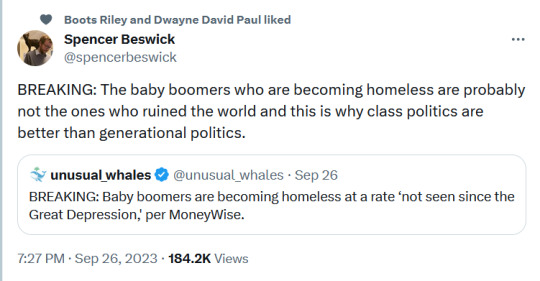
#twitter#tweet#tweets#boomers#economics#economy#homeless#class politics#generational politics#class#inequality#wealth inequality
38K notes
·
View notes
Text
reminder this pride month that disabled people in the US on SSI and some forms of SSDI* do not have the same marriage equality as people not on SSI and SSDI. its called the marriage penalty.
by getting married, a disabled person can lose their income, benefits, and health insurance.
if a disabled person marries an able bodied person, and combined their assets are $3000 or over they will lose all benefits, including medicaid (health insurance).
if a disabled person marries a disabled person, their assistance is lowered 25%.
we don’t have marriage equality until all disabled marriages are equal.
*SSDI title II (disabled adult child) does fall under the marriage penalty, regular SSDI does not.
sources x x x x
#pride#pride month#marriage equality#ableism#disability#actually disabled#lgbt#lgbtq#queer#lgbt rights#disabled rights#inequality#cripple punk#cpunk#cripplepunk
20K notes
·
View notes
Text
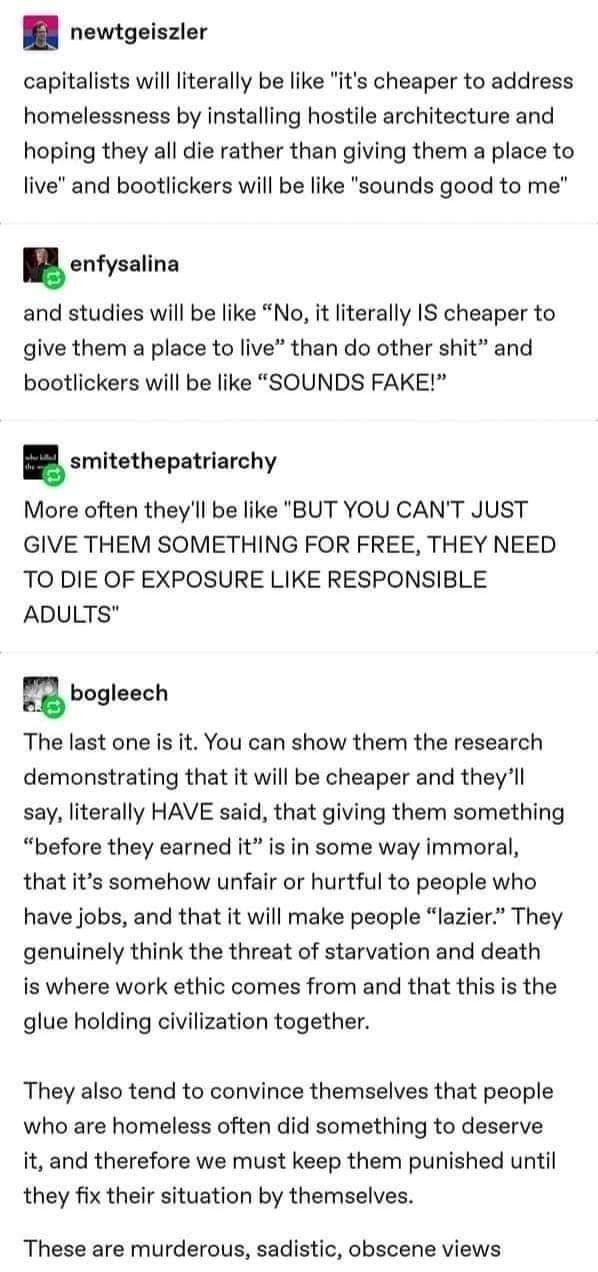
#anarchist#anarchism#anticapitalism#anticapitalist#anti capitalism#anarchy#homelessness#economic inequality#inequality#equality#eat the rich#fuck capitalism
7K notes
·
View notes
Link
Shoplifters who spoke to Novara Media said the cost of living crisis had pushed them to steal more of life’s essentials. “A couple of times I’ve been on the verge of crying when I go to buy Sainsbury’s Basics apple and blackcurrant squash and realise the price has doubled in the past three months,” said John.
Lara, a culture worker from London, has started shoplifting groceries more frequently; she said it has become more socially acceptable in her circles. “I know that other people do it, and I’ve seen how other people do it, and that really helped,” she said. Previously, she avoided stealing because her upbringing and wider moralism had convinced her it was “a shameful thing” to do.
“Before, I would have described stealing as this really anti-Islamic thing to do,” she said. Shoplifting is also especially frowned-upon by “parents who come from a working-class or lower middle-class background,” she said, because of how classist ‘scrounger’ stereotypes “trickle down to how we surveil and shame each other.”
Nowadays however, Lara sees shoplifting as “one of the few guerrilla tactics we have available to us.”
Alan, a construction worker from London, who, like John and Anna, has been shoplifting around half his groceries in recent months, has “no moral qualms” about stealing from supermarkets. “I just think that the stuff in the world is ours, all of ours,” he said, “and that we’ve invented a really stupid system for the distribution of resources which doesn’t treat them as ours, and treats them as things that can be used for capitalists to make profit.”
He wouldn’t steal things if it meant that “someone’s labour went unrewarded”, he said, but all shoplifting affects is “the profits of shareholders” he said. “[I have] no concerns about that at all.”
[...]
While, for many, shoplifting feels like a form of resistance to untenable living conditions, no one who spoke to Novara Media was sure how to build solidarity between shoplifters. Alan shoplifts food for rough sleepers, but wishes there were more organised approaches to shoplifting – like the mass stealing and redistribution of food that occurred in Greece following the 2008 financial crisis.
Lara believes shoplifting could be “revolutionary” if it could be “more of an organised operation” that involved “getting workers on side”.
“I think it would be really radical if there would be a widespread recognition and acceptance of stealing as a necessary mechanism for resistance,” she says. “If you can’t afford the things that you have to buy, then the logic should be that you just take them.”
14K notes
·
View notes
Text
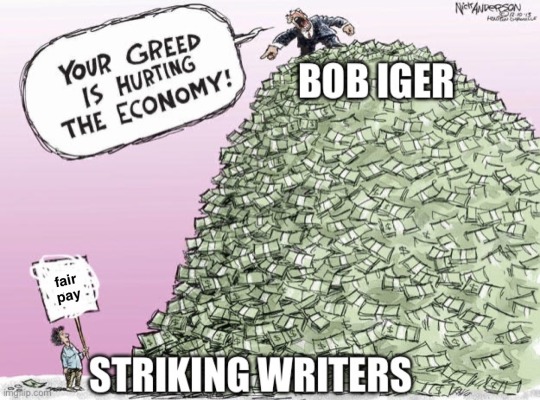
6K notes
·
View notes
Text
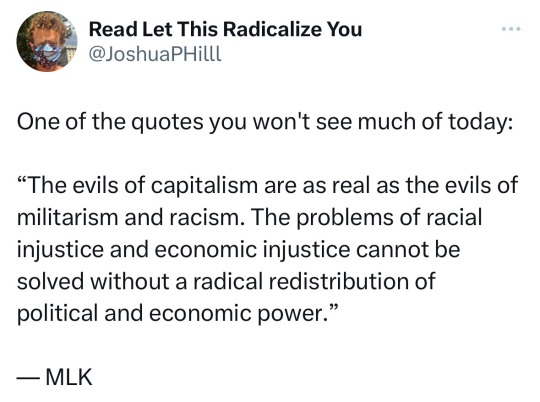
Source
#MLK#mlk day#mlk jr#politics#us politics#government#capitalism#the left#progressive#twitter post#racism#inequality#militarism#imperialism
1K notes
·
View notes
Text

Image:
A cartoon in two panels.
Panel 1: A shaded brick wall with a circular hole in it. Three shapes, a purple pentagon, a green trapezium, and a yellow triangle are looking at the hole with confused, sad, frustrated expressions.
A voice is coming though the hole:"I don't know what you guys are complaining about ...
"Panel 2: The brighter, sunnier side of the wall.
A lilac circle - looking very self-satisfied as the other shapes peer through the hole - says"If you want to make it through, just be yourself!"
Commentary text beneath the image:
Canikon-Bokeh "Exactly"
sonic-hip-attack 'Imagine a wall full of circular holes, that circles can keep walking in and out of with no difficulty.
'Now imagine that the triangles manage to get the resources together, after years of not being able to fit through the circle's holes,
to drill a single triangle space into the wall.
Now imagine that the circle who previously supported the triangle's efforts because they are well-rounded (har) and value equality comes along and sees the construction project.
But instead of being happy, they get angry '"Well, I won't be able to fit through your hole!!!! the circle cries.'"I helped you get the drill!!!!" the circle shrieks.'"Make it fit me too!!!!" the circle demands.
'The triangles, barely holding it together enough to get a triangle hole together stare at the circle in confusion.
'"You have all the holes you need," the triangles explain.
This is for us.
You don't need to fit through our hole, too."
'"YOU'RE BEING UNEQUAL AND HURTING MY FEELINGS!"
the circle wails, "I DON'T SUPPORT YOUR HOLE IF IT DOESN'T FIT ME TOO GIVE ME MY DRILL BACK."'
"It's not your drill, it's our drill. You helped us get it because you said you cared."'
"I ONLY CARED WHEN I THOUGHT YOU'D MAKE A HOLE EVERYONE COULD FIT THROUGH, YOU'RE PERPETUATING INEQUALITY!!"
'"Why is it up to us, the small group that has never been able to fit through the wall at all, to make a hole everyone can use?
Why isn't it up to you, the people who have been able to cross back and forth at will for years? We just want to see the other side, why are you yelling at us?"
'"I DIDN'T ASK TO BE BORN A CIRCLE OMG, I'VE HAD TO WORK HARD ALL MY LIFE TOO. YOU'RE JUST BEING BIGOTED AGAINST ME BECAUSE OF SOMETHING I CAN'T CONTROL JUST LIKE EVERYONE IS AGAINST YOU."'
"You are interfering with our project and asking us to comfort you while we're trying to make progress. Please leave."'
"I'm going to tell everyone about this," the circle warns.
"Nobody will support you now"'
"Apparently nobody ever did," the triangles sigh, getting back to work.'
SetFabulazersToMaximumCaptain'
It's kind of sad.'That we have to draw comics using colorful shapes 'To explain systematic inequality to people.
'FuckYeahFeminists
'this is brilliant'
3K notes
·
View notes
Text
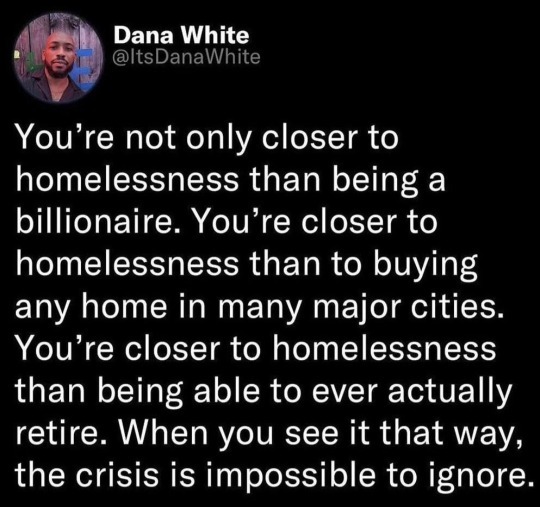
#politics#us politics#progressive#capitalism#homelessness#class war#eat the rich#billionaire#retirement#inequality#wealth inequality#homelessness crisis#poverty#middle class
1K notes
·
View notes
Text
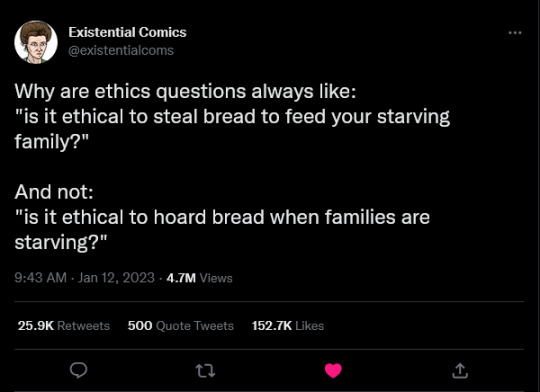
#ethics#critical thinking#capitalism#society#economics#poverty#homelessness#class struggle#inequality#class war#corporatism#working class#class warfare#authoritarianism#communism#anarchism#socialist#antifascist#anarchocommunism#revolution
6K notes
·
View notes
Photo
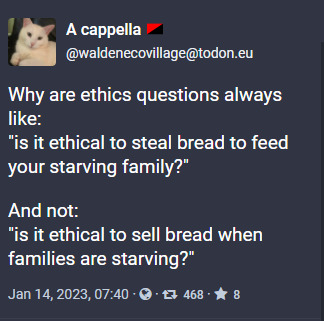
24K notes
·
View notes
Text
Conspiratorialism and the epistemological crisis
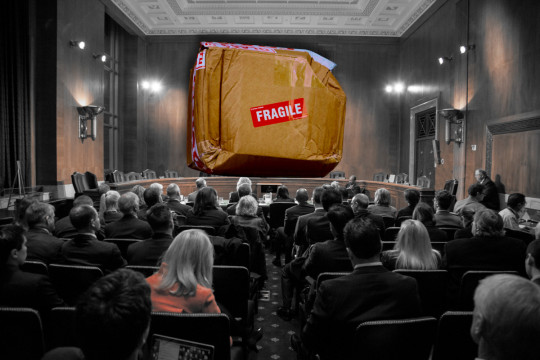
I'm on tour with my new, nationally bestselling novel The Bezzle! Catch me next weekend (Mar 30/31) in ANAHEIM at WONDERCON, then in Boston with Randall "XKCD" Munroe! (Apr 11), then Providence (Apr 12), and beyond!

Last year, Ed Pierson was supposed to fly from Seattle to New Jersey on Alaska Airlines. He boarded his flight, but then he had an urgent discussion with the flight attendant, explaining that as a former senior Boeing engineer, he'd specifically requested that flight because the aircraft wasn't a 737 Max:
https://www.cnn.com/travel/boeing-737-max-passenger-boycott/index.html
But for operational reasons, Alaska had switched out the equipment on the flight and there he was on a 737 Max, about to travel cross-continent, and he didn't feel safe doing so. He demanded to be let off the flight. His bags were offloaded and he walked back up the jetbridge after telling the spooked flight attendant, "I can’t go into detail right now, but I wasn’t planning on flying the Max, and I want to get off the plane."
Boeing, of course, is a flying disaster that was years in the making. Its planes have been falling out of the sky since 2019. Floods of whistleblowers have come forward to say its aircraft are unsafe. Pierson's not the only Boeing employee to state – both on and off the record – that he wouldn't fly on a specific model of Boeing aircraft, or, in some cases any recent Boeing aircraft:
https://pluralistic.net/2024/01/22/anything-that-cant-go-on-forever/#will-eventually-stop
And yet, for years, Boeing's regulators have allowed the company to keep turning out planes that keep turning out lemons. This is a pretty frightening situation, to say the least. I'm not an aerospace engineer, I'm not an aircraft safety inspector, but every time I book a flight, I have to make a decision about whether to trust Boeing's assurances that I can safely board one of its planes without dying.
In an ideal world, I wouldn't even have to think about this. I'd be able to trust that publicly accountable regulators were on the job, making sure that airplanes were airworthy. "Caveat emptor" is no way to run a civilian aviation system.
But even though I don't have the specialized expertise needed to assess the airworthiness of Boeing planes, I do have the much more general expertise needed to assess the trustworthiness of Boeing's regulator. The FAA has spent years deferring to Boeing, allowing it to self-certify that its aircraft were safe. Even when these assurances led to the death of hundreds of people, the FAA continued to allow Boeing to mark its own homework:
https://www.youtube.com/watch?v=Q8oCilY4szc
What's more, the FAA boss who presided over those hundreds of deaths was an ex-Boeing lobbyist, whom Trump subsequently appointed to run Boeing's oversight. He's not the only ex-insider who ended up a regulator, and there's plenty of ex-regulators now on Boeing's payroll:
https://therevolvingdoorproject.org/boeing-debacle-shows-need-to-investigate-trump-era-corruption/
You don't have to be an aviation expert to understand that companies have conflicts of interest when it comes to certifying their own products. "Market forces" aren't going to keep Boeing from shipping defective products, because the company's top brass are more worried about cashing out with this quarter's massive stock buybacks than they are about their successors' ability to manage the PR storm or Congressional hearings after their greed kills hundreds and hundreds of people.
You also don't have to be an aviation expert to understand that these conflicts persist even when a Boeing insider leaves the company to work for its regulators, or vice-versa. A regulator who anticipates a giant signing bonus from Boeing after their term in office, or a an ex-Boeing exec who holds millions in Boeing stock has an irreconcilable conflict of interest that will make it very hard – perhaps impossible – for them to hold the company to account when it trades safety for profit.
It's not just Boeing customers who feel justifiably anxious about trusting a system with such obvious conflicts of interest: Boeing's own executives, lobbyists and lawyers also refuse to participate in similarly flawed systems of oversight and conflict resolution. If Boeing was sued by its shareholders and the judge was also a pissed off Boeing shareholder, they would demand a recusal. If Boeing was looking for outside counsel to represent it in a liability suit brought by the family of one of its murder victims, they wouldn't hire the firm that was suing them – not even if that firm promised to be fair. If a Boeing executive's spouse sued for divorce, that exec wouldn't use the same lawyer as their soon-to-be-ex.
Sure, it takes specialized knowledge and training to be a lawyer, a judge, or an aircraft safety inspector. But anyone can look at the system those experts work in and spot its glaring defects. In other words, while acquiring expertise is hard, it's much easier to spot weaknesses in the process by which that expertise affects the world around us.
And therein lies the problem: aviation isn't the only technically complex, potentially lethal, and utterly, obviously untrustworthy system we all have to navigate. How about the building safety codes that governed the structure you're in right now? Plenty of people have blithely assumed that structural engineers carefully designed those standards, and that these standards were diligently upheld, only to discover in tragic, ghastly ways that this was wrong:
https://www.bbc.com/news/64568826
There are dozens – hundreds! – of life-or-death, highly technical questions you have to resolve every day just to survive. Should you trust the antilock braking firmware in your car? How about the food hygiene rules in the factories that produced the food in your shopping cart? Or the kitchen that made the pizza that was just delivered? Is your kid's school teaching them well, or will they grow up to be ignoramuses and thus economic roadkill?
Hell, even if I never get into another Boeing aircraft, I live in the approach path for Burbank airport, where Southwest lands 50+ Boeing flights every day. How can I be sure that the next Boeing 737 Max that falls out of the sky won't land on my roof?
This is the epistemological crisis we're living through today. Epistemology is the process by which we know things. The whole point of a transparent, democratically accountable process for expert technical deliberation is to resolve the epistemological challenge of making good choices about all of these life-or-death questions. Even the smartest person among us can't learn to evaluate all those questions, but we can all look at the process by which these questions are answered and draw conclusions about its soundness.
Is the process public? Are the people in charge of it forthright? Do they have conflicts of interest, and, if so, do they sit out any decision that gives even the appearance of impropriety? If new evidence comes to light – like, say, a horrific disaster – is there a way to re-open the process and change the rules?
The actual technical details might be a black box for us, opaque and indecipherable. But the box itself can be easily observed: is it made of sturdy material? Does it have sharp corners and clean lines? Or is it flimsy, irregular and torn? We don't have to know anything about the box's contents to conclude that we don't trust the box.
For example: we may not be experts in chemical engineering or water safety, but we can tell when a regulator is on the ball on these issues. Back in 2019, the West Virginia Department of Environmental Protection sought comment on its water safety regs. Dow Chemical – the largest corporation in the state's largest industry – filed comments arguing that WV should have lower standards for chemical contamination in its drinking water.
Now, I'm perfectly prepared to believe that there are safe levels of chemical runoff in the water supply. There's a lot of water in the water supply, after all, and "the dose makes the poison." What's more, I use the products whose manufacture results in that chemical waste. I want them to be made safely, but I do want them to be made – for one thing, the next time I have surgery, I want the anesthesiologist to start an IV with fresh, sterile plastic tubing.
And I'm not a chemist, let alone a water chemist. Neither am I a toxicologist. There are aspects of this debate I am totally unqualified to assess. Nevertheless, I think the WV process was a bad one, and here's why:
https://www.wvma.com/press/wvma-news/4244-wvma-statement-on-human-health-criteria-development
That's Dow's comment to the regulator (as proffered by its mouthpiece, the WV Manufacturers' Association, which it dominates). In that comment, Dow argues that West Virginians safely can absorb more poison than other Americans, because the people of West Virginia are fatter than other Americans, and so they have more tissue and thus a better ratio of poison to person than the typical American. But they don't stop there! They also say that West Virginians don't drink as much water as their out-of-state cousins, preferring to drink beer instead, so even if their water is more toxic, they'll be drinking less of it:
https://washingtonmonthly.com/2019/03/14/the-real-elitists-looking-down-on-trump-voters/
Even without any expertise in toxicology or water chemistry, I can tell that these are bullshit answers. The fact that the WV regulator accepted these comments tells me that they're not a good regulator. I was in WV last year to give a talk, and I didn't drink the tap water.
It's totally reasonable for non-experts to reject the conclusions of experts when the process by which those experts resolve their disagreements is obviously corrupt and irredeemably flawed. But some refusals carry higher costs – both for the refuseniks and the people around them – than my switching to bottled water when I was in Charleston.
Take vaccine denial (or "hesitancy"). Many people greeted the advent of an extremely rapid, high-tech covid vaccine with dread and mistrust. They argued that the pharma industry was dominated by corrupt, greedy corporations that routinely put their profits ahead of the public's safety, and that regulators, in Big Pharma's pocket, let them get away with mass murder.
The thing is, all that is true. Look, I've had five covid vaccinations, but not because I trust the pharma industry. I've had direct experience of how pharma sacrifices safety on greed's altar, and narrowly avoided harm myself. I have had chronic pain problems my whole life, and they've gotten worse every year. When my daughter was on the way, I decided this was going to get in the way of my ability to parent – I wanted to be able to carry her for long stretches! – and so I started aggressively pursuing the pain treatments I'd given up on many years before.
My journey led me to many specialists – physios, dieticians, rehab specialists, neurologists, surgeons – and I tried many, many therapies. Luckily, my wife had private insurance – we were in the UK then – and I could go to just about any doctor that seemed promising. That's how I found myself in the offices of a Harley Street quack, a prominent pain specialist, who had great news for me: it turned out that opioids were way safer than had previously been thought, and I could just take opioids every day and night for the rest of my life without any serious risk of addiction. It would be fine.
This sounded wrong to me. I'd lost several friends to overdoses, and watched others spiral into miserable lives as they struggled with addiction. So I "did my own research." Despite not having a background in chemistry, biology, neurology or pharmacology, I struggled through papers and read commentary and came to the conclusion that opioids weren't safe at all. Rather, corrupt billionaire pharma owners like the Sackler family had colluded with their regulators to risk the lives of millions by pushing falsified research that was finding publication in some of the most respected, peer-reviewed journals in the world.
I became an opioid denier, in other words.
I decided, based on my own research, that the experts were wrong, and that they were wrong for corrupt reasons, and that I couldn't trust their advice.
When anti-vaxxers decried the covid vaccines, they said things that were – in form at least – indistinguishable from the things I'd been saying 15 years earlier, when I decided to ignore my doctor's advice and throw away my medication on the grounds that it would probably harm me.
For me, faith in vaccines didn't come from a broad, newfound trust in the pharmaceutical system: rather, I judged that there was so much scrutiny on these new medications that it would overwhelm even pharma's ability to corruptly continue to sell a medication that they secretly knew to be harmful, as they'd done so many times before:
https://www.npr.org/2007/11/10/5470430/timeline-the-rise-and-fall-of-vioxx
But many of my peers had a different take on anti-vaxxers: for these friends and colleagues, anti-vaxxers were being foolish. Surprisingly, these people I'd long felt myself in broad agreement with began to defend the pharmaceutical system and its regulators. Once they saw that anti-vaxx was a wedge issue championed by right-wing culture war shitheads, they became not just pro-vaccine, but pro-pharma.
There's a name for this phenomenon: "schismogenesis." That's when you decide how you feel about an issue based on who supports it. Think of self-described "progressives" who became cheerleaders for the America's cruel, ruthless and lawless "intelligence community" when it seemed that US spooks were bent on Trump's ouster:
https://pluralistic.net/2021/12/18/schizmogenesis/
The fact that the FBI didn't like Trump didn't make them allies of progressive causes. This was and is the same entity that (among other things) tried to blackmail Martin Luther King, Jr into killing himself:
https://en.wikipedia.org/wiki/FBI%E2%80%93King_suicide_letter
But schismogenesis isn't merely a reactionary way of flip-flopping on issues based on reflexive enmity. It's actually a reasonable epistemological tactic: in a world where there are more issues you need to be clear on than you can possibly inform yourself about, you need some shortcuts. One shortcut – a shortcut that's failing – is to say, "Well, I'll provisionally believe whatever the expert system tells me is true." Another shortcut is, "I will provisionally disbelieve in whatever the people I know to act in bad faith are saying is true." That is, "schismogenesis."
Schismogenesis isn't a great tactic. It would be far better if we had a set of institutions we could all largely trust – if the black boxes where expert debate took place were sturdy, rectilinear and sharp-cornered.
But they're not. They're just not. Our regulatory process sucks. Corporate concentration makes it trivial for cartels to capture their regulators and steer them to conclusions that benefit corporate shareholders even if that means visiting enormous harm – even mass death – on the public:
https://pluralistic.net/2022/06/05/regulatory-capture/
No one hates Big Tech more than I do, but many of my co-belligerents in the war on Big Tech believe that the rise of conspiratorialism can be laid at tech platforms' feet. They say that Big Tech boasts of how good they are at algorithmically manipulating our beliefs, and attribute Qanons, flat earthers, and other outlandish conspiratorial cults to the misuse off those algorithms.
"We built a Big Data mind-control ray" is one of those extraordinary claims that requires extraordinary evidence. But the evidence for Big Tech's persuasion machines is very poor: mostly, it consists of tech platforms' own boasts to potential investors and customers for their advertising products. "We can change peoples' minds" has long been the boast of advertising companies, and it's clear that they can change the minds of customers for advertising.
Think of department store mogul John Wanamaker, who famously said "Half the money I spend on advertising is wasted; the trouble is I don't know which half." Today – thanks to commercial surveillance – we know that the true proportion of wasted advertising spending is more like 99.9%. Advertising agencies may be really good at convincing John Wanamaker and his successors, through prolonged, personal, intense selling – but that doesn't mean they're able to sell so efficiently to the rest of us with mass banner ads or spambots:
http://pluralistic.net/HowToDestroySurveillanceCapitalism
In other words, the fact that Facebook claims it is really good at persuasion doesn't mean that it's true. Just like the AI companies who claim their chatbots can do your job: they are much better at convincing your boss (who is insatiably horny for firing workers) than they are at actually producing an algorithm that can replace you. What's more, their profitability relies far more on convincing a rich, credulous business executive that their product works than it does on actually delivering a working product.
Now, I do think that Facebook and other tech giants play an important role in the rise of conspiratorial beliefs. However, that role isn't using algorithms to persuade people to mistrust our institutions. Rather Big Tech – like other corporate cartels – has so corrupted our regulatory system that they make trusting our institutions irrational.
Think of federal privacy law. The last time the US got a new federal consumer privacy law was in 1988, when Congress passed the Video Privacy Protection Act, a law that prohibits video store clerks from leaking your VHS rental history:
https://www.eff.org/deeplinks/2008/07/why-vppa-protects-youtube-and-viacom-employees
It's been a minute. There are very obvious privacy concerns haunting Americans, related to those tech giants, and yet the closest Congress can come to doing something about it is to attempt the forced sale of the sole Chinese tech giant with a US footprint to a US company, to ensure that its rampant privacy violations are conducted by our fellow Americans, and to force Chinese spies to buy their surveillance data on millions of Americans in the lawless, reckless swamp of US data-brokerages:
https://www.npr.org/2024/03/14/1238435508/tiktok-ban-bill-congress-china
For millions of Americans – especially younger Americans – the failure to pass (or even introduce!) a federal privacy law proves that our institutions can't be trusted. They're right:
https://www.tiktok.com/@pearlmania500/video/7345961470548512043
Occam's Razor cautions us to seek the simplest explanation for the phenomena we see in the world around us. There's a much simpler explanation for why people believe conspiracy theories they encounter online than the idea that the one time Facebook is telling the truth is when they're boasting about how well their products work – especially given the undeniable fact that everyone else who ever claimed to have perfected mind-control was a fantasist or a liar, from Rasputin to MK-ULTRA to pick-up artists.
Maybe people believe in conspiracy theories because they have hundreds of life-or-death decisions to make every day, and the institutions that are supposed to make that possible keep proving that they can't be trusted. Nevertheless, those decisions have to be made, and so something needs to fill the epistemological void left by the manifest unsoundness of the black box where the decisions get made.
For many people – millions – the thing that fills the black box is conspiracy fantasies. It's true that tech makes finding these conspiracy fantasies easier than ever, and it's true that tech makes forming communities of conspiratorial belief easier, too. But the vulnerability to conspiratorialism that algorithms identify and target people based on isn't a function of Big Data. It's a function of corruption – of life in a world in which real conspiracies (to steal your wages, or let rich people escape the consequences of their crimes, or sacrifice your safety to protect large firms' profits) are everywhere.
Progressives – which is to say, the coalition of liberals and leftists, in which liberals are the senior partners and spokespeople who control the Overton Window – used to identify and decry these conspiracies. But as right wing "populists" declared their opposition to these conspiracies – when Trump damned free trade and the mainstream media as tools of the ruling class – progressives leaned into schismogenesis and declared their vocal support for these old enemies of progress.
This is the crux of Naomi Klein's brilliant 2023 book Doppelganger: that as the progressive coalition started supporting these unworthy and broken institutions, the right spun up "mirror world" versions of their critique, distorted versions that focus on scapegoating vulnerable groups rather than fighting unworthy institutions:
https://pluralistic.net/2023/09/05/not-that-naomi/#if-the-naomi-be-klein-youre-doing-just-fine
This is a long tradition in politics: hundreds of years ago, some leftists branded antisemitism "the socialism of fools." Rather than condemning the system's embrace of the finance sector and its wealthy beneficiaries, anti-semites blame a disfavored group of people – people who are just as likely as anyone to suffer under the system:
https://en.wikipedia.org/wiki/Antisemitism_is_the_socialism_of_fools
It's an ugly, shallow, cartoon version of socialism's measured and comprehensive analysis of how the class system actually works and why it's so harmful to everyone except a tiny elite. Literally cartoonish: the shadow-world version of socialism co-opts and simplifies the iconography of class struggle. And schismogenesis – "if the right likes this, I don't" – sends "progressive" scolds after anyone who dares to criticize finance as the crux of our world's problems as popularizing "antisemetic dog-whistles."
This is the problem with "horseshoe theory" – the idea that the far right and the far left bend all the way around to meet each other:
https://pluralistic.net/2024/02/26/horsehoe-crab/#substantive-disagreement
When the right criticizes pharma companies, they tell us to "do our own research" (e.g. ignore the systemic problems of people being forced to work under dangerous conditions during a pandemic while individually assessing conflicting claims about vaccine safety, ideally landing on buying "supplements" from a grifter). When the left criticizes pharma, it's to argue for universal access to medicine and vigorous public oversight of pharma companies. These aren't the same thing:
https://pluralistic.net/2021/05/25/the-other-shoe-drops/#quid-pro-quo
Long before opportunistic right wing politicians realized they could get mileage out of pointing at the terrifying epistemological crisis of trying to make good choices in an age of institutions that can't be trusted, the left was sounding the alarm. Conspiratorialism – the fracturing of our shared reality – is a serious problem, weakening our ability to respond effectively to endless disasters of the polycrisis.
But by blaming the problem of conspiratorialism on the credulity of believers (rather than the deserved disrepute of the institutions they have lost faith in) we adopt the logic of the right: "conspiratorialism is a problem of individuals believing wrong things," rather than "a system that makes wrong explanations credible – and a schismogenic insistence that these institutions are sound and trustworthy."

If you'd like an essay-formatted version of this post to read or share, here's a link to it on pluralistic.net, my surveillance-free, ad-free, tracker-free blog:
https://pluralistic.net/2024/03/25/black-boxes/#when-you-know-you-know

Image:
Nuclear Regulatory Commission (modified)
https://www.flickr.com/photos/nrcgov/15993154185/
meanwell-packaging.co.uk
https://www.flickr.com/photos/195311218@N08/52159853896
CC BY 2.0
https://creativecommons.org/licenses/by/2.0/
#pluralistic#conspiratorialism#epistemology#epistemological crisis#mind control rays#opioid denial#vaccine denial#regulatory capture#boeing#corruption#inequality#monopoly#apple#dma#eu
291 notes
·
View notes
Text
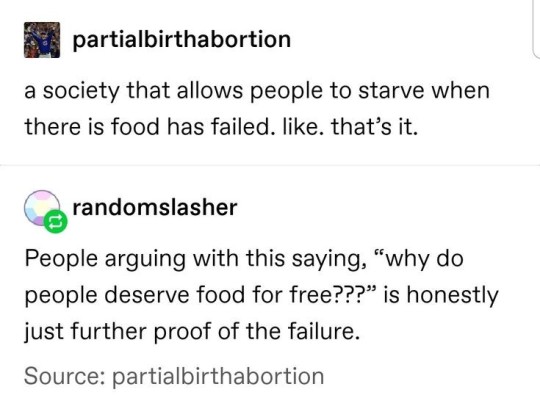
#anarchist#anarchism#anticapitalism#anticapitalist#anarchy#anti capitalism#communism#economic inequality#inequality#equality#end world hunger#world hunger#hunger#poverty#eat the rich
8K notes
·
View notes
Photo

Percentage of country’s total household wealth held by the country’s wealthiest 1%.
by land_geist
272 notes
·
View notes
Text
As environmental, social and humanitarian crises escalate, the world can no longer afford two things: first, the costs of economic inequality; and second, the rich. Between 2020 and 2022, the world’s most affluent 1% of people captured nearly twice as much of the new global wealth created as did the other 99% of individuals put together, and in 2019 they emitted as much carbon dioxide as the poorest two-thirds of humanity. In the decade to 2022, the world’s billionaires more than doubled their wealth, to almost US$12 trillion.
The evidence gathered by social epidemiologists, including us, shows that large differences in income are a powerful social stressor that is increasingly rendering societies dysfunctional. For example, bigger gaps between rich and poor are accompanied by higher rates of homicide and imprisonment. They also correspond to more infant mortality, obesity, drug abuse and COVID-19 deaths, as well as higher rates of teenage pregnancy and lower levels of child well-being, social mobility and public trust. The homicide rate in the United States — the most unequal Western democracy — is more than 11 times that in Norway. Imprisonment rates are ten times as high, and infant mortality and obesity rates twice as high.
[...]
Our work has shown that the amount spent on advertising as a proportion of gross domestic product is higher in countries with greater inequality. The well-publicized lifestyles of the rich promote standards and ways of living that others seek to emulate, triggering cascades of expenditure for holiday homes, swimming pools, travel, clothes and expensive cars.
Oxfam reports that, on average, each of the richest 1% of people in the world produces 100 times the emissions of the average person in the poorest half of the world’s population. That is the scale of the injustice. As poorer countries raise their material standards, the rich will have to lower theirs.
[...]
The scientific evidence is stark that reducing inequality is a fundamental precondition for addressing the environmental, health and social crises the world is facing. It’s essential that policymakers act quickly to reverse decades of rising inequality and curb the highest incomes.
355 notes
·
View notes
Text
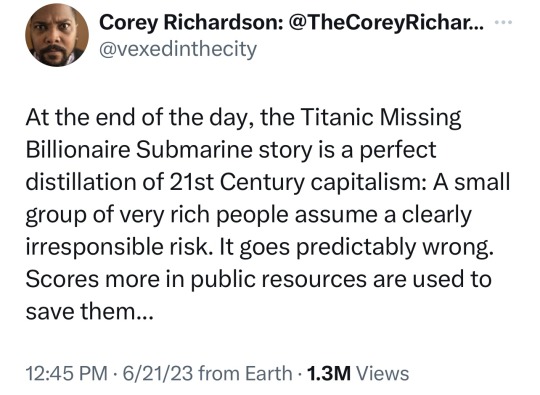

Such a good analogy for “privatizing the profits, but socializing the losses.”
Taxpayers, not the wealthy owners of OceanGate, will be paying the millions of dollars in costs for the search and rescue—and I almost wouldn’t have a problem with that (the coastguard rescues hapless people every day, and I don’t think that regular citizens should be forced to pay for their own rescues, because saving people is what a society should come together and do).
But the owners of OceanGate not only knew of the risks, they eschewed any kind of government regulation (like having an emergency location beacon that would have made the search far easier) because they said it would inhibit growth and profits. And I can’t help but believe that the coastguard and the navy and all of the other public agencies, are searching just a little bit longer and a little bit harder, because it’s rich people who are missing.
And don’t even get me started on how Greece’s coastguard is most likely responsible for the murder of hundreds of refugees, or how Italy and much of Europe have made it national policy for their coastguards to not help refugees at sea.
Anyway, it’s well past time for more people to start seriously thinking about how our society always bails out banks and wealthy billionaires, but tells poor people to exercise better judgment and pull themselves up by their bootstraps.
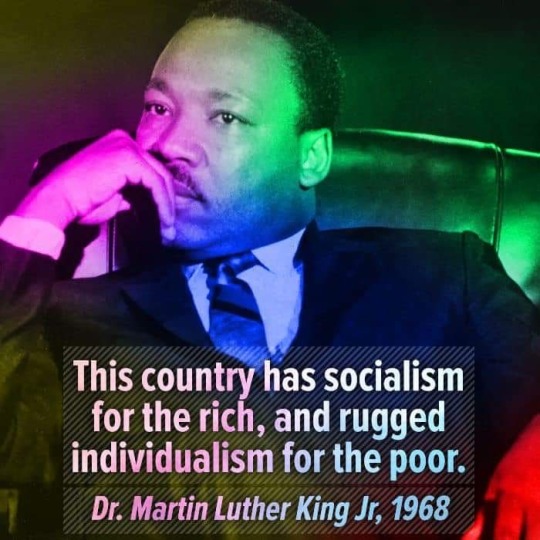
4K notes
·
View notes
Text
"A man is washed clean with a glass of water, but the entire sea can't clean a woman."
—Albanian Proverb.
Meaning: Men are easily forgiven for the same mistakes with a small gesture, while women face ongoing judgment, revealing unfair expectations based on gender. This proverb shines a light on sexism within a culture, illustrating unequal forgiveness based on gender and emphasizing the need for awareness and change.
#albanian#albanian proverb#proverbs#proverb#arabic proverb#sexism#culture#aesthetic#quotes#old quotes#old#vintage#literature#book quotes#sea#ocean#inequality
274 notes
·
View notes